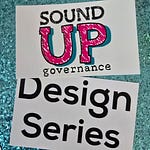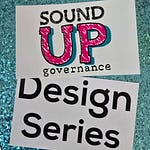TRANSCRIPT
Matt Voiceover
Welcome back to Sound-Up Governance. This week we have Part One of another two-parter and with a returning guest no less. Here on episode 34 We have episode five's Andrew Escobar back on the show. Andrew's LinkedIn profile reads "Fintech explorer and open banking advocate at MX." A highlight of his professional experience is that for 12 years, he's been on the board of the Canadian Internet Registration Authority or CIRA, although his tenure is coming to an end this fall. I always think of him as one of the most curious governance minds in my community, which I guess is also something. But when I asked Andrew how he'd like me to describe them, for the purposes of this episode, he said, "I wouldn't use a title, you can just say Andrew Escobar," which perfectly captures the experience of a 30-something with 12 years of board experience, and with his governance future a giant question mark, being invited to talk about governance on a governance themed podcast. He and I think of good governance in really similar ways. And I wanted to bring him back to talk about a whole bunch of stuff, but let's start at the beginning. Sure, we think that corporate governance needs to change, but I wondered if Andrew had a clear idea of what problem we're even trying to solve.
Andrew Escobar
I think the problem is that directors and boards began to question the value they bring to the organizations they serve. And while let's say 20 years ago that there was this awakening of okay, well, we need to take this compliance work more seriously. We're gonna make sure that bad things don't happen, and that we exercise our oversight role in the best way possible. And there was a lot of attention played to that aspect of corporate governance. But I think what directors are now starting to consider more is, what is good governance? What is the value that I bring as an individual to this team? And what do we, as a board, what's the value that we deliver to the organization? And when you start framing the problem like that, you then begin to question the way that you do your work, the way that you approach problems, and the way that you commit as a group to solve them.
Matt Voiceover
My first reaction to Andrew's comment was to reflect on something my friend, Professor Aida Sijamic Wahid, who I really need to get on this podcast... Anyway, Aida said something to me a couple of weeks ago that I couldn't believe I'd never thought about before. Boards and executives are conditioned so that the first word they think of when they think of corporate governance is "oversight." But - and here was the light bulb that Aida caused to go off - oversight is inherently backward oriented. Maybe a little bit about the present, but certainly not about the future. Seriously, ask 10 directors what they think their job is, and nine of them will use the word "oversight" in the first sentence. So we - and by we, I mean, the whole world of governance experts, from directors, to executives, to consultants to educators - have conditioned boards almost to do the opposite of the thing they really think they should be doing, which is orienting themselves toward the future. Maybe that's part of the problem Andrew's getting at.
Andrew Escobar
And I wonder if that's what's changing. That view that your work as a board member is simply to focus on hindsight, and oversight, right? What happened last year? What's happening today? As opposed to spending more time on what's happening tomorrow? What type of organization will we be a year from now? 5-10 years from now? What are the problems we're going to encounter? How do we begin to maybe not solve them today, but start planning against them today? Because it's a process. And how do you improve upon that process? I think that that is the, I hope, the awakening that we're seeing within boards and their directors. For me, one of the lightbulb moments that I had, it was 2018, and it was the first day of my I was completing the Institute of Corporate Directors' Director Education Program. And it was day one and I won't name the two directors. But these two senior directors on meaningful, challenging boards pose a very difficult question. Does the work that we do matter to the organization? And they meant it. And they didn't mean it to demean their work or all of our work. But that is the way they wanted to approach the 12 days that we had together. They want to understand what's the value that they were trying to achieve as directors, and as a board. They got me thinking about, Okay, well, what am I, what am I here to do as a director, as a board member? And it became getting that balance, right. To be less focused and fixated almost on the compliance aspects of my work, which is all hindsight and oversight oriented, and to think more about the future. And if you simply view the board's job as compliance, hindsight, oversight, you miss out on the real value that I think boards deliver today, which is foresight, thinking about the future. And that's a lot harder to do than the hindsight and oversight work that everyone would say is their job as a board member, right? That fiduciary duty that you have to the board, to the corporation. That's that's the problem. Not to say that that isn't necessary work, of course it's necessary. But finding the right balance is key to your work as a board
Matt
This question, which I really like of, do I even matter? And I don't know if those directors meant it as a provocation to the room to say, "let's prove to ourselves that we matter, because you do matter." Or if it was maybe more sincere, like, "I actually don't know if I matter or how to matter." Either way, I don't think it's a framing that most executives or directors are too concerned about the moment they walk into a boardroom for the first time, they're not really wondering to themselves, "how do I come into this room and actually do something great?" And if they did, it might be of interest to more people to actually figure out what great means. And let me give an example that's related to what you're talking about. So if, if we talk about foresight, which I like in theory, but I don't think is sufficiently specific for us to know how to walk into a room and do it. The other term that's very common is we need to, quote unquote, be more strategic, which I think also isn't sufficiently specific for people to know how to walk into a room and do it. Because if it were, then they would just do it. Right? If we could say, "we need to do foresight," and everyone agrees, you'd just start doing it. If you said if you wanted to be more strategic, and everybody agrees, and you knew what that looked like, you'd just start doing it. Right? There wouldn't be anything in your way. Okay, let's maybe I'll ask a silly question. What does it feel like to you, or how do you know when you're quote unquote, being strategic or doing foresight?
Andrew Escobar
It's moments when I'm not specifically working on a problem at hand that we have today. When we're thinking about problems, or opportunities that we anticipate coming down the line in the future. When you start setting yourself up for success in that way, and think about those, that future state, future risks, future problems, future opportunities that you can capitalize on. When you put yourself in that place, that to me is the foresight work. That to me, is the strategy work. Thinking about a strategic problem and saying yes or no to it in the moment, that actually, to me strikes me more like oversight work. That's passing a really substantial budget, or a corporate restructuring, or changing your capital structure like that might might be present day problems, as opposed to future problems. And so the less definition there is around what you're trying to solve, I think is actually where the most value is. And that and that's exactly why it's difficult. Because the problem isn't perfectly defined. It's not placed right in front of you in a binary way. You are tasked as a board or hopefully tasked as a board to think about the problems in a more open, constructive way. Even saying that out loud, that doesn't sound like much that's it sounds like you're not approaching the problem with rigor or intent. But I actually do think that that is the most impactful work that I've done on a board. It's the stuff that is not perfectly defined, but setting us up for the future. I love that work.
Matt
So it almost sounds like part of what's missing in that more oversight-y version of this is that - and this is a normal behavior in boardrooms in general - is we're expecting management to process and digest whatever kind of stuff comes into the room, maybe even all the way down to a recommendation by the time it gets into the boardroom, right? So any opportunity for foresight has basically been synthesized out of the process by the time the board gets to even look at it, or at least to have a conversation about it. And so basically, the conversation that happens is a conversation about "okay, well, what do we need to consider before we approve this?" Instead of "how do we co create our co define the problem at hand before we even imagine what paths we might travel and, and, and?" Right? Is that a fair? I'm giving an extreme example to illustrate a point.
Andrew Escobar
It is. It's a good example, because most of the decisions that arrive in a board package or in a boardroom are binary decisions. And I understand that that's ultimately the outcome, like you want a binary decision in front of a board that they can say yes or no to. But that a board would accept a process that only includes a binary decision that arises at the table, to me is wrong. You need to have a process in place that allows for some give and take, some feedback into the process. And understanding how the decision can change. What are the options on the table? So that it isn't a binary decision. And what you want to try to avoid is, of course, figuring out what those alternatives are in the boardroom. And I know we want to put everything into a board meeting. But if you think of all the other work that we do in our lives, we're moving away from meetings. But then how do you... I mean, this is sounds awful, but how do you get more meetings? Right? How do you structure more? Everything if needs to happen in a meeting, how do you structure more meetings that are respectful of people's time, but actually let you arrive at decisions that that are ultimately not binary? They were decided on bits and pieces, and there was room to adapt and understand the problem and really arrive at something that that's better for everyone. Where the board is actually contributing, and management has the room to deliver something not that's simply going to pass the board's approval, but really is like ambitious, manages risk, grows the company, grows the bottom line, grows the mission impact. I think that you need a more dynamic process in place if that's what your end goal is. And simply arriving at binary decisions that have passed committee, passed the board and then you move on, that doesn't work.
Matt
So would it be a fair concern to you if a manager, especially a CEO, countered this concept by saying, I just feel like the board's not trusting my judgment.
Andrew Escobar
Trust goes both ways. It's not a lack of trust in judgment, I need to understand the decision we're going to make as a board. And it's that shared understanding of the decision and the outcome. That's what, to me good governance is. A shared understanding of what the problem is, and the different ways that we can solve it. And simply arriving at the one solution to me isn't good enough. And, of course, much of the work, the majority work is not going to happen in a board meeting, or in in committees or the the regular board process. So much of that work happens within the organization, it feeds its way up to the board. But it means that our boards need to shift the way that we work. And that management needs to be willing to shift, as well, the way they work with boards. And I guess that's the challenge. You're not trying to just move boards in one direction, you're actually trying to move senior management teams and leaders in that direction as well.
Matt
There's not a lot of, of current board members anywhere who would out loud, say, that's the definition of my job. And that's what I expect to be doing when I get in the room. I mean, should we be recruiting different directors?
Andrew Escobar
The easy answer there is yes.
Matt
Okay.
Andrew Escobar
I think the more nuanced answer is... actually, probably still yes, actually. I do think there's something to say with the current pool of directors that we have today. That's what we have today. And it's important that we work on, maybe not the skills that those directors bring to the table. I don't think that needs to change. It's more their view of their role.
Matt
Right.
Andrew Escobar
But I think it's fairly cemented in their minds what their role is
Matt
for sure.
Andrew Escobar
And isn't. And it's fairly cemented in the role of management teams what the role of the board is and isn't. So simply saying we need to bring on new directors who have a fresh perspective on governance, or their role as directors, hat isn't sufficient. Because you don't, you don't, you haven't solved the problem yet. And so as you slowly bring on new directors, as you slowly increase your applicant pool and bring in new people into the process, you fail them, and you fail at your intents of actually making the boardroom more dynamic.
Matt Voiceover
So I asked Andrew, if as a board member with 12 years of experience in the CIRA boardroom, and also as a person with super big thinking and countercultural ideas about governance, maybe he and people like him are the ones best positioned to be change agents in their boardrooms. His answer surprised me a bit.
Andrew Escobar
I think it's really challenging to do something for so many years in the same way, and then try to do something different, or to be the one to propose something different. Because you've already done it, and it works. And you know, it works, because you part of it. My biggest challenge is that, you know, six years into my journey, I definitely wanted to approach my work in a different way. And I wanted our board to approach work in a different way. But I think I knew that I wasn't the change agent that our board needed. And that most boards need. At that time. It was very much for me important to have new individuals come in and lead that change. I think that's what I've been most successful at is supporting those individuals. My current chair is fantastic. Absolutely love working with her and supporting her in her role. I'm now the Vice Chair of the Board. And she's the kind of change agent that I think our board needed. But we have other individual directors who have joined us over the last few years who are also change agents, and figuring out a way to include them in our process and to be heard, that's how change will continue to happen long after I'm gone. I wasn't I wasn't the one to change our board. It is these new individuals who have come on, who have really changed the way that we think about our future and the way that we solve problems today. That's not to say that I haven't contributed in my own way. But I couldn't have done it with a board that, I think this is the heart of it, with a board that has constant membership. One of the benefits of our board - I've been on that board for 12 years, but there is a healthy rotation of board members. I think I've seen the board now completely flip, maybe twice. And it's difficult to manage that change at times. But it's also incredibly healthy. And so while I was the one to do it, supporting others to bring that change is I think the value that I brought to that board.
Matt Voiceover
That brings us to the end of part one of my recent chat with Andrew Escobar. Can you believe there's even more? In next week's episode we talk about making sure that a board's future oriented work actually ends up being useful to management, and also about how important it can be to have creativity in the boardroom. In the meantime, reach out to me anytime at soundup@groundupgovernance.com if you have any ideas for future guests or topics or any of your own ideas about how to nudge boards and executives toward being more like what they say they want to be. Catch you next time.














Share this post